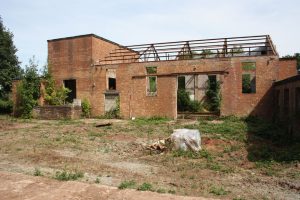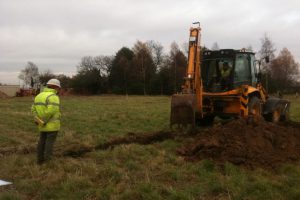Archaeology and Development
The English landscape has a complex past and sometimes it is unavoidable that, during the course of development or redevelopment, archaeological remains are uncovered or historic structures are altered. Archaeology is protected through the planning process, making the management of archaeological risk a necessary precaution.
“Archaeology can be overlooked as a discipline, I think, but it’s incredibly important to have this one way of approaching the past-not just through historical documents, but through actual physical remains-objects, buildings and the layout of towns.”
Dr Alice Roberts
In 2012 the National Planning Policy Framework (NPPF) was published, a document setting out the Government planning Policy for England and consolidating two dozen previous documents. Current NPPF 2019 revision, under paragraphs 189. 199, NPPF states that it is the developer’s responsibility when dealing with heritage assets that may be affected during the course of development to describe the significance of an heritage asset, as well as to record and advance understanding of the heritage asset.
189. In determining applications, local planning authorities should require an applicant to describe the significance of any heritage assets affected, including any contribution made by their setting. The level of detail should be proportionate to the assets’ importance and no more than is sufficient to understand the potential impact of the proposal on their significance. As a minimum the relevant historic environment record should have been consulted and the heritage assets assessed using appropriate expertise where necessary. Where a site on which development is proposed includes, or has the potential to include, heritage assets with archaeological interest, local planning authorities should require developers to submit an appropriate desk-based assessment and, where necessary, a field evaluation[1].
199. Local planning authorities should require developers to record and advance understanding of the significance of any heritage assets to be lost (wholly or in part) in a manner proportionate to their importance and the impact, and to make this evidence (and any archive generated) publicly accessible. However, the ability to record evidence of our past should not be a factor in deciding whether such loss should be permitted[1].
Any development, large or small has the potential to require archaeological works as part of the planning process, whether as pre-determination assessment and investigation or as a condition of planning permission.
1.National Planning Policy Guidance 2019 revision www.gov.uk/guidance/national-planning-policy-framework
What’s Involved?
It is the developer’s responsibility to provide appropriate information to the local authority which will be used by the authority’s archaeological advisor to determine the type and scope of archaeological investigation required.
Usually, the first thing to happen once the local authority has imposed an archaeological condition on a development project is that they will ask for the developer to produce a Written Scheme of Investigation (WSI) for the archaeological works.
A WSI is basically a method statement detailing the steps taken by the developer to ensure that the proper and correct procedure will be taken during an archaeological intervention. It is usually the first port of call and written prior to the actual physical intervention taking place. A WSI should be part of the archaeological condition attached to the planning application, although the document alone will not clear the archaeological condition as a standalone document.



Related organisations to UK archaeology
The leading professional body representing archaeologists working throughout the UK and overseas. It is important that you employ a Registered Organisation (RO) with the CIfA, or an accredited individual (MCIfA). In most cases this is a requirement from the local planning authority.
A Government service championing England’s heritage and giving expert, constructive advice.
The professional institute which represents conservation professionals in the public and private sectors in the UK and Ireland.
An educational charity working throughout the UK to involve people in archaeology.



